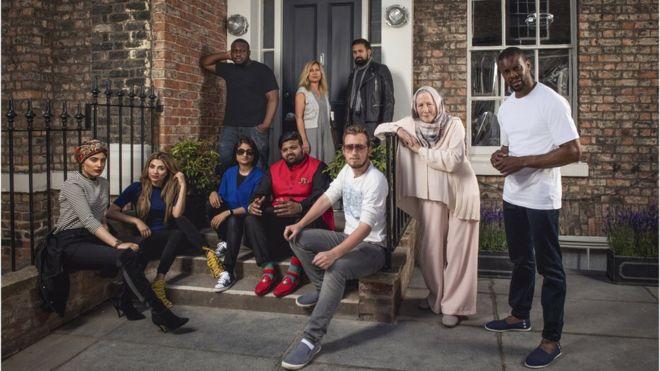"Muslims Like Us" aims to show the diversity of Britain's Muslim communities.
Around 2.7 million people in Britain today identify as Muslim — around 1 in 25 people. In the media, they are often portrayed as a single, unified community. But a new BBC TV series is challenging that notion.
"Muslims Like Us" is a social experiment in which 10 Muslims of different ages, genders and ethnicities live together in a shared house for 10 days. It's basically an accelerated version of "Big Brother" for British Muslims. Their conversations (and sometimes disagreements) on a wide range of topics are recorded.
Among those in the house are a school teacher, a stand-up comedian, a Syrian student and a social worker.
One of the most controversial participants is Abdul Haq, a convert to Islam and a former boxer. Abdul Haq had his passport confiscated by the British authorities because of his suspected involvement in Islamist extremism. He tells the program producer that he would want to go to Syria if he were allowed. His inclusion has been criticized in the British press as irresponsible.
oembed://https%3A//www.youtube.com/watch%3Fv%3Dv_NIMoj8jFA
Series producer Mobeen Azhar defends Abdul Haq's presence, saying it's important to illustrate the diversity of British Muslim opinion. “So often in the mainstream narrative we hear commentators say that the Muslim community ‘needs to do more’ to challenge and silence these radical voices [like Haq’s]. In our program, over two hours, you see that unfold and happen for real. So this individual is argued with, he’s shouted down, he’s challenged robustly by the nine other contributors.”
Haq refuses to sit with female members of the house, and at one point passes one of the female participants a leaflet on wearing the jilbaab, a head-to-toe religious covering. In the second episode he won't clearly condemn the murder of a friend of a Shiite member of the house, because he regards Shiite Muslims as "kufarr," or unbelievers.
The program also reveals racial tensions among the Muslims in the house. Nabil Abdulrashid, a Nigerian-British stand-up comedian, describes the racial abuse that he has received as a result of his wife being South Asian, while he is black. “Her family have been fantastic,” he says. “But I’ve had [other] people messaging me saying that my wife is n****r lover, that ‘why did one of our sisters marry a monkey? Gorilla? Ape?' It doesn’t even bother me because if that’s what comes into your mind, that’s an insecurity you have.”
For series producer Azhar, the public response to the show on social media has been rewarding. “Overwhelmingly they’ve been saying they’ve learned a lot — they didn’t know the Muslim community was diverse — not just in terms of its make-up, but also in terms of its opinions and politics.”
There's been plenty of criticism, however. The Middle East Eye called the program a "neo-Orientalist circus show," while Guardian writers disagreed about whether "Muslims Like Us" dismantles stereotypes or reinforces them.
The Telegraph review was unequivocal, saying that the second episode "told us little about Islam and Britishness and everything about shouty, tacky reality TV."
Every day, reporters and producers at The World are hard at work bringing you human-centered news from across the globe. But we can’t do it without you. We need your support to ensure we can continue this work for another year.
Make a gift today, and you’ll help us unlock a matching gift of $67,000!
